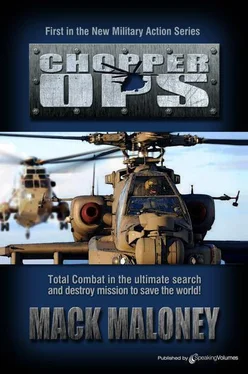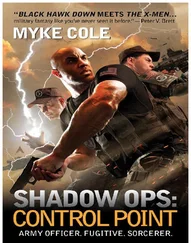Mack Maloney - Chopper Ops
Здесь есть возможность читать онлайн «Mack Maloney - Chopper Ops» весь текст электронной книги совершенно бесплатно (целиком полную версию без сокращений). В некоторых случаях можно слушать аудио, скачать через торрент в формате fb2 и присутствует краткое содержание. Город: Naples, FL, Год выпуска: 2011, ISBN: 2011, Издательство: Berkley, Жанр: Боевик, на английском языке. Описание произведения, (предисловие) а так же отзывы посетителей доступны на портале библиотеки ЛибКат.
- Название:Chopper Ops
- Автор:
- Издательство:Berkley
- Жанр:
- Год:2011
- Город:Naples, FL
- ISBN:978-1-61232-148-6
- Рейтинг книги:3 / 5. Голосов: 1
-
Избранное:Добавить в избранное
- Отзывы:
-
Ваша оценка:
- 60
- 1
- 2
- 3
- 4
- 5
Chopper Ops: краткое содержание, описание и аннотация
Предлагаем к чтению аннотацию, описание, краткое содержание или предисловие (зависит от того, что написал сам автор книги «Chopper Ops»). Если вы не нашли необходимую информацию о книге — напишите в комментариях, мы постараемся отыскать её.
Chopper Ops — читать онлайн бесплатно полную книгу (весь текст) целиком
Ниже представлен текст книги, разбитый по страницам. Система сохранения места последней прочитанной страницы, позволяет с удобством читать онлайн бесплатно книгу «Chopper Ops», без необходимости каждый раз заново искать на чём Вы остановились. Поставьте закладку, и сможете в любой момент перейти на страницу, на которой закончили чтение.
Интервал:
Закладка:
That was when Ricco, usually the more cautious of the two, had to think quick. Finally he just declared, “Fuck it!” goosed the throttles, and yanked back on the controls.
A second later, they were airborne.
It was amazing how well the aircraft smoothed out! Once its wheels had left the ground, the engines took on an almost symphonic hum. The fuel in the back stopped sloshing. The bolts stopped rattling.
All three men breathed a sigh of relief.
“Piece of cake,” Ricco declared, adding power and lifting the huge copter higher into the early morning sky. “A big piece of fucking cake…”
It had been a long night for Joe Cool’s Marines.
It started the previous afternoon, when they bivouacked on the northern end of the island, setting up tents among the rocks on the craggy beach and establishing a defense perimeter just as if they were in a combat situation.
They had spent the worst of the night’s rainstorm here, huddled in their ponchos, more concerned about their gear getting blown away than keeping themselves dry.
When the storm began dissipating slightly around 0330 hours, some of the Marines were finally able to go horizontal. But at exactly 0345, they were roused out of their tents by their sergeants, and told to muster up with full packs and be inside Hangar 3 in fifteen minutes.
Much rushing around ensued as men grabbed their gear and suited up. The entire contingent was lined up and ready in under four minutes, though. What faced them now was the mile-long hump from their present position down to Hangar 3.
There were eighty-two of them in all and as one, they began running. Across the beach, over the dunes, through the isolated maintenance area, past the “motels,” and over the main runway. The first of them were at the front door of Hangar 3 by 0358 hours.
There, waiting for them, was their CO, Captain Chou Koo.
The last man staggered in at 0402 hours, but Chou did not mind. Not many soldiers could endure near-hurricane conditions and be in full pack a mile away on strictly leg power on fifteen minutes notice. And Chou knew it.
He had trained them well.
Their official unit title was actually a secret. They were known instead by various nicknames, depending on the operation. Organized in 1991 to take care of some post-Gulf War messes around the Persian Gulf, the classified Marine unit had first been tagged Zebra Company. When the scene shifted to Bosnia, they were coded Company 801. In Somalia, they were known as Task Force 22. Since then they had bounced around Africa, Asia, and the subcontinent, putting out fires too small for the big units like Delta Force or taking on things the SEALs simply weren’t interested in, or were too busy to do. These days they were known as Team 66.
This was a good name because Chou likened the unit to a team of utility infielders. Indeed, most of them had just missed making the big leagues. Many were jarheads who couldn’t quite pass the training for the SFALs or Delta Force, or any number of other deep programs run by the U.S. military. Some had missed making it into these higher-echelon units simply because of things as minor as a 5-percent hearing loss in one ear or a rare allergy. One guy was missing the tip of his left hand’s index finger. Several others were color-blind. Many of the men wore glasses or contacts. Some had flat feet. This made them no less strong, no less capable, no less loyal or effective. They took on the jobs no one else wanted with gusto. As a result, their mission record, though little known, was full of success stories.
Chou had been in charge of them since 1996 and since becoming CO, he had emphasized their versatility. That was now their real forte. They could do wet operations with the best of them; they could do para-drops. They were as adept in the jungle as in the snow. They were excellent at hand-to-hand and silent combat; they could work the latest and biggest infantry weapons. They excelled at rescuing hostages, tracking terrorists, handling nuclear or biological threats.
They were a very special group and their handlers at the Pentagon knew it. That was why they never hesitated to loan them out to the CIA or the NSA or any other Spook outfit needing some quick firepower somewhere around the world.
But for all their successes and experience, there was one thing Team 66 had never done: They had never worked from helicopters.
And this worried Chou.
For many reasons.
Thus the need for this unusual drill.
He had them form up again, and then ushered them wordlessly into the huge hangar.
There they found two helicopters, the contents of the third and fourth C-5 deliveries earlier this stormy night. About the same size as the Hook, and also designed by the Russian military, they were Mi-26 Halos. They were pure, dedicated troop carriers with cargo holds nearly as big as that of a C-130 Hercules. The Marines just stared at the huge copters. Just about all of them could fit inside one. That was how big these choppers were.
“We will be conducting ingress and egress exercises with these helos for the next few hours, gentlemen,” Chou told them. “I suggest that in between, you familiarize yourself with these rather unusual aircraft. You will be seeing a lot of them in the future.”
Chou then split his company into two, and with the aid of a whistle and a stopwatch, loaded them onto the two helicopters. Then, with the blow of the whistle, the doors were opened again and his men piled out and deployed in protective rings around each chopper.
On the first try, it took the eighty-two Marines forty-eight seconds to completely deploy out of the choppers and set up their defensive perimeters.
Not bad, Chou thought. But he knew they would have to cut that time at least in half. So he had them do it again. And again.
And again.
By 0630 hours, the Marines had done the drill no less than fifty-eight times and had cut the time to thirty seconds. Again, not bad at all for so many fully equipped troops to stand up, straighten their gear, pile out of each copter, and go into a full combat mode by surrounding each aircraft in its own protective ring.
But Chou knew more drilling would be needed to shave another ten seconds off that time.
Still, he was pleased with their performance and told them so. Like their endless mock assaults on the Motel Six building, they never stopped trying to get better. But the most difficult part of this early morning was still ahead. It was heralded by the arrival of Smitz at Hangar 3 around 0645 hours. His ever-present IBM NoteBook out and turned on, he told Chou simply: “It’s time to get going.”
Moments later, a Humvee arrived and four men piled out. They were wearing the distinctive green flight uniforms of U.S. Army Aviation.
These men were introduced to Chou’s company as being part of the Army’s OPFOR unit based at Fort Polk in the Louisiana swamplands. It was from there, Smitz revealed to Chou, that the Russian-built choppers had come originally. In this upcoming mission, the Army guys would be flying the huge Halo copters.
Chou shook hands with them, then turned back to his men.
“OK, troops,” he said. “Pile back in. We’re all going for a ride.”
By this time, both the Hind gunship and the fuel-laden Hook had been airborne for about thirty minutes.
Norton was putting the Hind through its paces over a section of the Florida Straits known as Military Reservation Box 31.
He was falling in love with the massive copter—strange as that seemed. Once in the air, it flew as easily and smoothly as a small airplane. The controls were ultra-responsive, and somehow its size and bulk were offset by its powerful engines and the two stubby wings helping out with the lift. The presence of the stubby wings also allowed for the gunship’s huge rotor to dedicate most of its work to pushing the copter forward.
Читать дальшеИнтервал:
Закладка:
Похожие книги на «Chopper Ops»
Представляем Вашему вниманию похожие книги на «Chopper Ops» списком для выбора. Мы отобрали схожую по названию и смыслу литературу в надежде предоставить читателям больше вариантов отыскать новые, интересные, ещё непрочитанные произведения.
Обсуждение, отзывы о книге «Chopper Ops» и просто собственные мнения читателей. Оставьте ваши комментарии, напишите, что Вы думаете о произведении, его смысле или главных героях. Укажите что конкретно понравилось, а что нет, и почему Вы так считаете.












